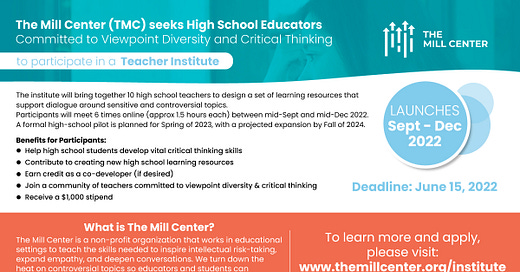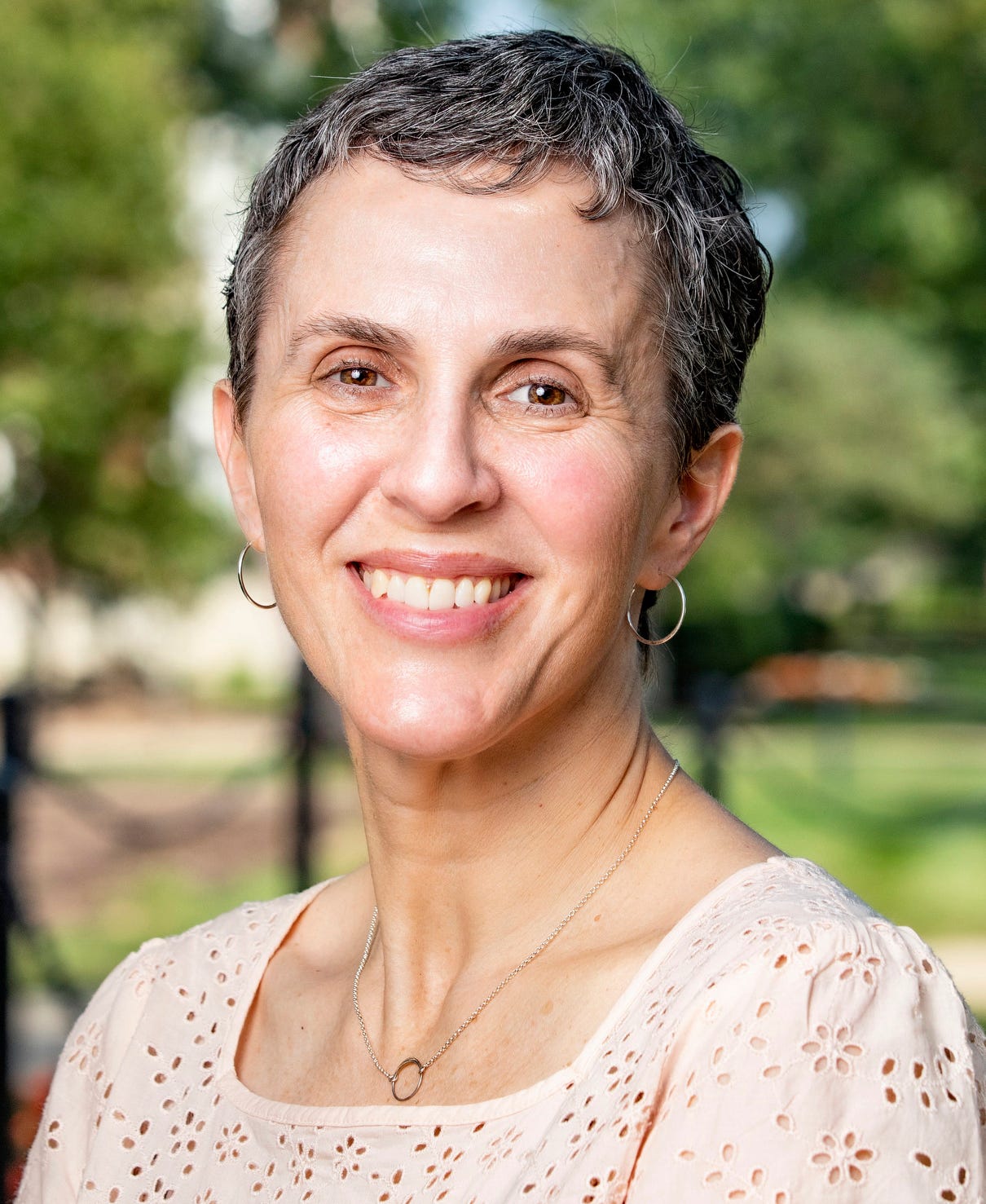The Mill Center Turns Down the Heat on Controversial Topics
Apply to the Inaugural Teacher Institute for High School Educators, Fall 2022
Today, in celebration of 1.5 years in operation, Free Black Thought is delighted to present a post from our friends at The Mill Center, whose goal of fostering “genuine and compassionate curiosity for multiple points of view” as “the basis of a tolerant and open society” we emphatically endorse. Like The Mill Center, we aim to promote free, constructive dialog as an antidote to the many illiberal threats to speech and mutual understanding afoot in the USA and beyond. We thank you, readers, for supporting our Twitter, Journal, and Compendium of Free Black Thought, and we urge you to extend your support to The Mill Center.
—The Editors
THE MILL CENTER TURNS DOWN THE HEAT ON CONTROVERSIAL TOPICS
Apply to the Inaugural Teacher Institute for High School Educators, Fall 2022
By Ilana Redstone, Ellie Avishai, and Christina LaRose
Over the past several years, we—a team of scholars, researchers, and educators—have become increasingly concerned about the impact of broken discourse in our professional and personal communities. To help solve this problem, we recently launched The Mill Center, a nonprofit organization dedicated to teaching the skills needed to inspire intellectual risk-taking, expand empathy, and deepen conversations in educational settings. We named our organization The Mill Center after John Stuart Mill, specifically because of his work On Liberty (1859), in which he articulates the importance of freedom of thought and speech, critical thinking, and intellectual humility.
It’s no secret that our current social and political environment often dissuades, rather than enables, the kinds of conversations and intellectual risk-taking we are hoping to encourage. Some scholars have offered insightful macro-analyses of where the challenges of the moment have come from. In contrast, we come at the problem by focusing on the micro and asking: What does it take to create the conditions for nuanced dialogue in any particular learning environment? How do educators create a space where students don’t need to be afraid that they will say the wrong thing? How do we cultivate sophisticated thinkers who can solve problems, innovate, and advance knowledge?
After years of working independently in different parts of the US and Canada, with students from high school to college, we have each developed toolkits of learning resources to advance students’ critical thinking skills. Over the past year, we’ve collaborated to create a process that turns down the heat on controversial topics so educators and students can untangle complex issues together. The Mill Center’s goal is to teach the mindset, skills, and ground rules needed to broaden conversations and expand knowledge.
This process consists of developing three sets of abilities: an open-inquiry mindset, community ground rules, and five categories of important intellectual skills. Let’s take these in turn.
First, an open-inquiry mindset helps us think about our role and our goal in any conversation. It consists of four core statements: (1) I can always learn more about myself, others, and the world around me; (2) I can dig into the details of messy information. The most interesting problems usually don’t have obvious right answers; (3) I can let go of certainty—my current ideas and beliefs do not define me; 4) I’m curious about people who see things differently than I do.
Second, clearly articulated ground rules are vital for creating a shared understanding of what the group is attempting to accomplish and how it will get there. Our community ground rules include: (1) Seek out multiple, conflicting perspectives; (2) No ideas are off the table, ignored, or untouchable; (3) Treat others as individuals, not as representatives of any group; (4) People can rephrase statements or questions if they don’t feel they said it right the first time.
Third and finally, The Mill Center toolbox contains five categories of skills: (1) applying an analytical lens, (2) interpreting data and recognizing its limits, (3) reflecting on our own thinking, (4) exploring the thinking of others, and (5) generating new ideas. Each of these categories houses a set of sub-skills including mapping arguments, assessing the validity of statistics, media literacy, active and empathetic listening, self-reflection, and more.
While some might see our mission as political in nature, we do not. The Mill Center does not align itself with any political party or ideological affiliation and we partner with organizations across the political spectrum, such as Free Black Thought, who share our commitment to diversity of thought. We do not believe that we need to agree with a partner on all topics in order to work with them. We seek partnerships with organizations that (1) maintain an active commitment to fostering intellectual curiosity in exploring ideas; (2) are transparent about the work they do, who they work with, and what ideas they promote; and (3) are willing to have their own perspectives challenged while also challenging others’ perspectives in the pursuit of knowledge. We also want to work with educators who share these values, which leads us to an exciting announcement:
Thanks to a generous grant from the Mercatus Center’s Program on Pluralism and Civil Exchange, we will be launching our inaugural Teacher Institute for high school educators in the fall of 2022. This institute will bring together teachers from across the U.S. to collaborate on the design of new classroom resources that promote open inquiry and viewpoint diversity. Please click here for more information and to apply. If you are not a high school educator, please pass this on to teachers in your network. The application deadline is June 15, 2022.
The Mill Center is committed to promoting more productive dialogue, and to building communities where people have genuine and compassionate curiosity for multiple points of view. We are looking for teachers who would like to join us, as we believe that these capacities form the basis of a tolerant and open society. To learn more about The Mill Center, please visit our website and follow us on Twitter.
Ilana Redstone is a sociology professor at the University of Illinois. She has a joint PhD from the University of Pennsylvania (2005) in Sociology and Demography. She has been teaching and writing on topics related to critical thinking for several years. In her co-authored book, Unassailable Ideas: How Unwritten Rules and Social Media Shape Discourse in American Higher Education, published in Fall 2020 by Oxford University Press, she and her co-author examine the implications of the trend on campus to operate under a narrowly prescribed set of beliefs—beliefs that are particularly problematic precisely because they go unexamined. Ilana is the author of “The Certainty Trap” and a Founding Faculty Fellow at the University of Austin.
Ellie Avishai is a strategist, educator, and non-profit leader who has worked in education for more than 20 years. She is the founder of the I-Think Initiative at the Rotman School of Management, which teaches Integrative Thinking to students, teachers, and education leaders. Ellie has consulted to school districts across the United States and Canada, with a focus on leadership development and building innovative practices. She has an MBA from the Rotman School of Management and a doctorate from Harvard.
Christina LaRose has a PhD from the University of Michigan (2018) in English Literature. She also holds a Master of Fine Arts in Creative Writing. Her expertise is in writing and the teaching of writing, specifically science and technical writing, rhetoric and composition, logic and argumentation, and advanced exposition. She received the University of Michigan English Department’s Distinguished Undergraduate Teaching Award (2014) and has taught writing at the University of Michigan, Purdue University, Ohio State University, and in the OSU Young Scholars Program. Currently, she designs curricula that promote critical thinking, intellectual humility, and viewpoint diversity.








What a wonderful program! Highly recommend Synthesis as well: https://synthesis.is/
Very nice. Thank You all. Wishing You greatest success in all Your endeavors. We need it.